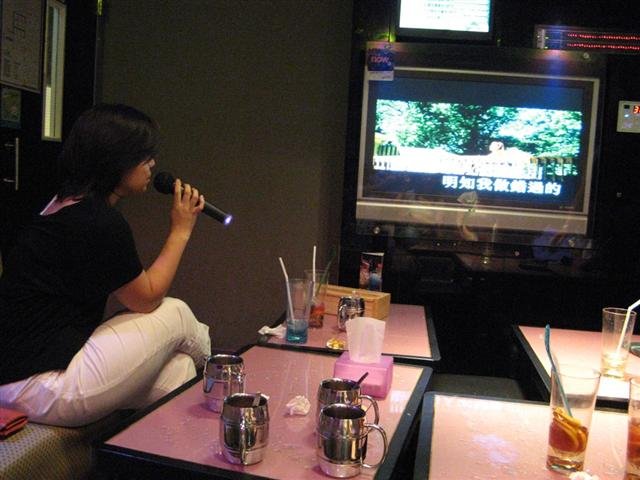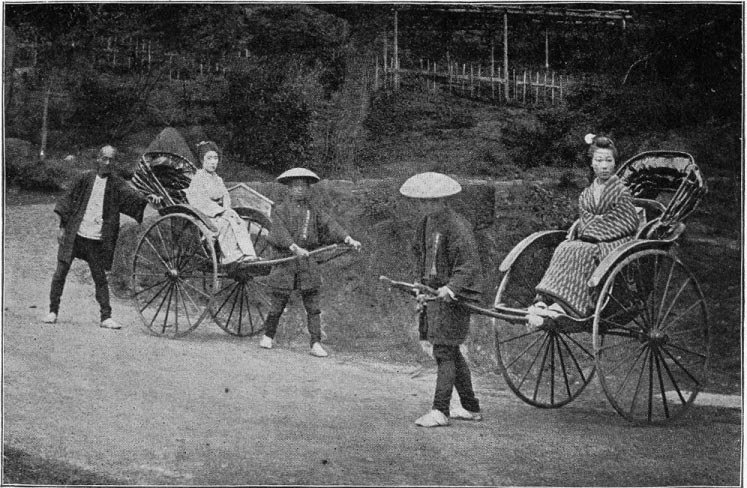
I wrote this as a piece for a local magazine some years back. I was going through some of my old writing and came across it; thought I might dust it off, clean it up a little, shorten it to just the list, and share it here.
As most of you know English is the Blob of world languages: it just eats and absorbs almost every word it encounters. Often we change the grammar and punctuation of a loanword to better match English, but just as often we keep the foreign grammar and punctuation! English doesn't care—it just wants more words! MORE!
A number of these words English has gobbled up are from Japanese. Many of these words we can easily identity as Japanese, but some have been with us for so long that we may not realize they come from the Land of the Rising Sun. Let's take a look at ten words from Japanese—some obvious ones you may know and some less obvious.

#10. Karaoke
You probably knew this one. Invented by Shigeichi Negishi in 1967, the word combines kara (empty) and ōkesutora (orchestra) to make karaoke (カラオケ). You may know this one is Japanese, but did you know that the Japanese pronounce it entirely different from us? Most American dialects render it something like "care-ree-oh-key", whereas in Japanese it is pronounced "kah-rah-oh-keh".

#9. Honcho
Usually in American English we use this word in the phrase head honcho and use it to refer to the highest ranking person in a group or organization. This comes from the Japanese hanchō (班長) which means "squad leader". It entered English after the second world war, as many American soldiers recalled hearing the Japanese use it to refer to their superior officers.
#8 Skosh (as in "Just a skosh")
This comes from sukoshi (少し) which has the same meaning of "a tiny amount". When said quickly in Japanese, it sounds a lot like skosh, so the English pronunciation isn't surprising nor far off. This also seems to have entered English shortly after WWII.
#7 Soy
You may think of the product as coming from Japan or somewhere in East Asia, but you may not be aware the word itself comes from Japanese by way of Dutch? In Japanese soy sauce is shōyu (醤油). When the Dutch started to export the product in the 1670s, they took it from Satsuma and in Satsuma dialect, 醤油 was pronounced soi. The Dutch then called it soja. When it later arrived in America, it was taken in as soy.
#6 Rickshaw
When you think of a rickshaw you may have the image of a small Asian man pulling sightseers (or of Kramer pulling Newman) and you may correctly think the device comes from Japan, but you may not realize the word does as well. In Japanese it is jinrikisha (人力車), which is literally human powered wagon. In slang this can be abbreviated to rikisha and this abbreviation is that came into English. There is some debate on where rickshaws come from. They seem to have been first invented in France in or around 1679. They were then reinvented in Japan in 1869. Japan was much quicker to export them than France had been and so the Japanese name became the common one all over the world.

#5 Ramen
Ramen is actually from Chinese where it was pronounced lāmiànrāmen. It was introduced to the world from Japan in the form of instant noodles, so the Japanese name stuck. Most people probably think of ramen as cheap food for college students. It can be that in Japan too, but it is often made with much better quality ingredients and is so much better than those cheap grocery store freeze-dried noodles. This could probably be a post by itself! (any other Japan residents of Hive, feel free to take that one) (拉麵). (Perhaps @kaixin can confirm if I got that right). The Japanese took the word and pronounced it
#4 Futon
The word futon (布団) is exactly the same in Japanese, though pronounced differently (fu in English is not quite the same as ふ, the first syllable of the word) but the object to which it refers is a bit different. In English this is a cheap couch that doubles as an uncomfortable bed for guests. But in Japan it refers to a very comfortable mattress used to sleep on the floor. I would avoid a US futon like my life depended on it, but I love my Japan futon.

#3 Kamikaze
In English this refers to the the suicide pilots in WWII or a suicide attack in general and is pronounced kah-may kah-zee. In Japan it can have this meeting, though the suicide pilots are usually referred to using tokkōtai (特攻隊, "special attack unit"). The English word came from the full official squad name of the unit shinpū tokubetsu kōgeki tai (神風特別攻撃隊, "Divine wind special attack unit"). Japanese media at the time informally shortened this to 神風 which was read as kamikaze. Rather than the suicide pilots, in Japan the word is more likely to refer to the typhoons that saved Japan from being invaded by the Mongols in 1274 and again in 1281. (Those two events are amazing stories to be told another time.) In either case, it is pronounced kah-me kah-zeh in Japanese.

#2 emoji
Everyone loves emoji 🥰, those fun🕺 pictures 🖼 we can use on our phones 📱and computers 💻. But did you know the word comes from Japanese? 🤯 It comes from e (絵) meaning picture and moji (文字) meaning character. They started on Japanese phones as a graphical replacement for kaomoji (the Japanese version of emotcons, ^_^ instead of :) and so on) in the late 90s. Years later, Apple added them to the iPhone 3 but only in Japan. Hackers soon discovered them and made them available to iPhone users outside of Japan and they proved so popular that Apple made them available to everyone with the next version using the Japanese name emoji. From there they jumped to all phones and our computers too. This is why a great many of the emoji you see in the listing of them are still specific to Japan (for example 🏣—bet you don't know what that is).
#1. Tycoon
This is a wealthy and powerful person in business, a business tycoon or sometimes a real estate tycoon. Usually it takes on a slightly negative tone to suggest they are also ruthless. This was actually something of a foreign Japanese word. When Commodore Perry forced Japan open in 1854, the West was at a loss to explain the power structure in Japan. There was the emperor but also the shogun who seemed to have all the power but claimed subservience to the emperor. It was decided that the emperor (called Mikado at the time by foreigners) was more like the pope and the shogun like a king. Townsend Harris, the American consul to Japan, decided the correct title for the shogun should be taikun (大君), from the middle Chinese for great and prince and this word was used by foreigners to refer to the shogun until his downfall in 1868. It entered English shortly after, first to refer to any great person (President Lincoln was "the Tycoon", for instance) but later around the 1920s it took on its modern meaning.

Well there you go. Ten interesting words from Japanese that we use in English. Did you know them all? Of course there are a great many more, but most are pretty straight forward (eg samurai, ninja, karate, etc).
Oh yeah, I mentioned that English sometimes adopts foreign grammar when it takes loanwords. For Japanese loanwords, the borrowed grammar is to use the same form for both singular and plural. That is, in Japanese words usually don't have a specific plural form, so this rule is retained in English for Japanese loanwords.
But then again, this is actually changing and these days both adding an s or not adding s are ok. So that is to say, you might see "The seven samurai attached the fort" or you might see "The seven samurais attacked the fort." Both forms are acceptable in English, though specific style-guides may have a preference for one or the other. Interesting, many Japanese inspired words like Jedi seem to follow this (it's offically Jedi even for plurals, though some fans may add the s).
If you have any other favorite Japanese loanwords, let me know in the comments!
❦


 |
David LaSpina is an American photographer and translator lost in Japan, trying to capture the beauty of this country one photo at a time and searching for the perfect haiku. |
If this blog post has entertained or helped you, please follow/upvote/reblog. If you want to further support my writing, donations are welcome.
As an Asian (a Filipino) I have known most of these words since I was a kid. And even then, we already knew about their Japanese origins, particularly kamikaze since my maternal grandfather was in the Army in WW2, and told us a lot of stories fighting the Japanese.
Also quite common here in usage, and common knowledge of its origin too is karaoke, since we Filipinos love to sing. So I am quite surprised that many have just realized just now that these words came from the Japanese, especially with their obvious un-Westernlike spelling. 😉
Thanks for the great comment! Have some !PIZZA
I've been in Japan 20 years and speak the language, so these are pretty obvious to me too, but as you can see from the other comments, they are far from obvious to most people. Even as simple a one as karaoke. The pronunciation has shifted so much from the original Japanese that most people accept it as a completely English word.
Spelling is not really much of a clue, since English spelling is a horrible mess, so a strangely spelled word could be from the Norman conquest, or it could be from the grammarians years later who tried to Latinize so many English words that weren't even originally from Latin, or it could have been one of the words mangled by the great vowel shift. Similarly, English contains words from almost all living languages and many dead ones so even if one can correctly identify a loanword, unless they are familiar with Japanese they probably can't realize that loanword is Japanese.
Very interesting!
I would not imagine that direct Japanese words would have a meaning in English! (Other than cultural objects that often retains their original prononciation)
I remember, I was invited to a conference on lean management in my old company and the only thing I remember is the presenter talking about mudazzzzz (from 無駄, but plural 😆)
For some reason I picture the Bitconnect guy yelling that.
That was very useful cos I use these words all the time and just take for granted they are English in origin.
Glad you enjoyed it
Lol I wouldn't call it enjoyment mate.
An eye opener this is❗❗❗ so wonderful you shared them😁😁
Glad you found it useful
Gold! Love it 😊As someone who studied Japanese at school (and plans to study it again before I finally visit Japan sometime in the next few years) I smiled several times while reading this 😄 Arigato!
どういたしまして
Stretches her mind
trying to remember
those vaguely familiar characters...
do u i ta shi ma shi te ???
Gives up
Googles
and then giggles;
I was close!!
Thanks, DeepL Translator for helping me understand the meaning of どういたしまして
David, ありがとうございます for inspiring me to consider re-learning some Japanese sooner rather than later 😊
I've learnt some words in Japanese from this article. Thanks for sharing
You're welcome!
Thanks for that. I knew about most of them, but not the last two!
You're welcome! I was thinking the last two might be more unknown.
I didn't know a few of them. Thanks for sharing.
You're welcome!
That’s so much education in one post.
And here we are using most of these words and not really knowing their origin.
Thanks for the education.
Arigato kosaimas
PIZZA Holders sent $PIZZA tips in this post's comments:
(1/15) @dbooster tipped @kryptik.tigrrr3d (x1)
Please vote for pizza.witness!
Oo, yeah. And bukkake, right?
Interesting. I always assumed honcho came from somewhere in South America. It just shows how little I know.